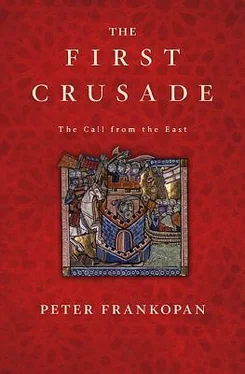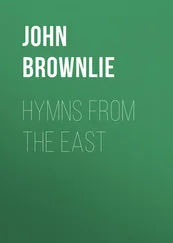In reality, the leadership evolved during the course of the difficult journey east. And while there is something to be said for the idea that Urban hedged his bets, avoiding to disabuse the competing egos of some of Europe’s most powerful men of their belief that they were his representatives, there was another reason why the issue of overall leadership was not addressed decisively by the Pope: the westerners would come under the command of Alexios I Komnenos when they arrived in Byzantium. Urban, for reasons of tact and strategy, may have been chary about making it explicit, but the truth was that the Byzantine emperor was overseeing operations.
Similarly, while the overarching aims of the Crusade were clear enough – defending the Christian Church in the east, driving back the pagan Turks, and finally reaching Jerusalem – the precise military objectives were left obscure. There was no talk of conquering or occupying the Holy City, let alone holding it in the future. There was no clear plan, for example, of what they would do when they reached Jerusalem. Nor were there any details about which towns, regions and provinces were to be targeted in their fight against the Turks. Again, the explanation for this lay in Constantinople. It was Alexios who was to set the strategic goals: Nicaea, Tarsos, Antioch and other important towns that had fallen to the Turks were the Byzantine priorities – and, at least to start with, these targets would be accepted by the Crusaders when they arrived in Constantinople. In the meantime, the military plans were of secondary importance, and limited significance, to the politically minded Pope.
The emperor’s vision was also fundamental in shaping the recruitment process for the Crusade. Alexios needed military support, rather than goodwill. He needed to attract individuals with fighting experience to take on the Turks, and, accordingly, this was relentlessly stressed by the Pope. As one contemporary cleric emphasised: ‘I am in a position to know, as one who heard with his own ears the words of the Lord Pope Urban, when he at once urged laymen to make the pilgrimage to Jerusalem and at the same time, prohibited monks from doing so.’ 54He forbade ‘those unsuited to battle’ to take part in the expedition, says another chronicler, ‘because such pilgrims are more of a hindrance than a help, a burden rather than of any practical use’. 55
Amid ‘the popular and great arousal of the Christian people’, as one document refers to it, the Pope had to make strenuous efforts to exclude all whose participation would be obstructive. 56He was explicit about this when he wrote to the monks of the monastery of
Vallombrosa in Tuscany in the autumn of 1096: ‘We have heard that some of you want to set out with the knights who are making for Jerusalem with the good intention of liberating Christianity. This is the right kind of sacrifice, but it is planned by the wrong kind of person. For we were stimulating the minds of the knights to go on this expedition, since they might be able to restrain the savagery of the Saracens and restore the Christians to their former freedom.’ 57He said much the same thing when he wrote to the inhabitants of Bologna shortly before this. 58
Senior clergy reinforced the message, although not without difficulty. The bishop of Toulouse had to work hard to dissuade Emerias of Alteias, a woman of considerable wealth, from joining the expedition. She was so determined that she had already ‘raised the cross on her right shoulder’, and taken a vow to reach Jerusalem. Very reluctantly she agreed not to make the journey – but only after the bishop made great efforts to convince her that the establishment of a hospice for the poor would be both a more welcome and appropriate gesture. 59
Giving Alexios an effective fighting force was important. So too was forming an idea of its size. Logistical arrangements had to be to put in place in Constantinople to receive large numbers of men in a short period of time, and central planning was required to work out how to welcome, provision and guide the westerners as they arrived in Byzantium. This was presumably one reason why the Pope insisted from the very outset that anyone wishing to join the expedition was required to take an oath. At Piacenza, after listening to the Byzantine envoys, ‘Our Lord Pope called upon many to perform this service, to promise by oaths to journey there by God’s will and to bring the emperor the most faithful assistance against the heathen to the limits of their power.’ 60This was restated emphatically at Clermont, where Urban emphasised the requirement to declare formally the intention to participate. 61Conversely, those who thought about changing their minds were threatened with terrible consequences, warned that they were turning their back on God: ‘anyone who seeks to turn back having taken the vow shall place the cross on his back between his shoulders ... and is not worthy of me [cf. Matthew 10:38]’. 62
There is no evidence to suggest that a formal record was being kept to note how many individuals were preparing to take the cross, and it is unclear if it would have been possible to keep such a tally anyway. Nevertheless, it quickly became obvious that very substantial numbers indeed were committing themselves to taking part. In this respect, then, it was significant that it was Urban himself who was so central to the recruitment of knights in France. On several occasions, the Pope could be found personally taking the oaths of men who were to join the expedition. 63And each time he met leading magnates or preached the Crusade – in places like Limoges, Angers and Le Mans, and in Tours, Nîmes and elsewhere – he could form an idea that huge numbers were clamouring to take part, even if these were difficult to quantify.
The ambitious and optimistic Pope and the beleaguered emperor in Constantinople both hoped for a substantial response to the calls to arms; but neither can have anticipated its extraordinary scale. The Pope’s efforts to follow developments in Spain in the late 1080s and early 1090s had led him to offer incentives not dissimilar to those given to the would-be Crusaders; but this had not provoked a surge in knights heading into the Iberian peninsula. 64The factors that inflamed Europe and opened the floodgates for the First Crusade, by contrast, were Jerusalem on the one hand, and the recognition that reports of the sudden collapse in the east – principally in Asia Minor – were accurate and a real cause for concern, on the other.
News of the numbers preparing to take part in the expedition, even if only rough estimates, evidently found their way back to Alexios, for the emperor set about preparing accordingly. That the Crusaders were successfully provisioned as they marched across Byzantine territory in several large contingents points tellingly to the fact that measures had been carefully put in place by the emperor. Necessary arrangements had been made at the entry points to the empire and along the principal routes leading towards Constantinople.
In part, this was itself possible because a clear time frame for the expedition had been established at the beginning. The Pope had set a fixed departure date of 15 August – the primary holy day of the summer, the Feast of the Assumption. While this was partly intended to impose a structure on the forthcoming journey, it was also designed to allow a co-ordinated response in Byzantium. And with a departure date in the summer, a good nine months after
Urban’s speech at Clermont, there was time to stockpile the foodstuffs that would be required to support the westerners on their arrival.
Nowhere was this more important than at Kibotos. This site was identified in advance by Alexios as the holding point for the western knights as they converged into a single force and prepared to assault Nicaea. A complex infrastructure was put in place in anticipation of the many thousands who were due to arrive: food stores, supplies and merchants were all made ready for a massive influx of men and horses. 65A Latin monastery may well also have been founded immediately before their arrival to cater for spiritual needs – and also to underline Alexios’ own openness to the Roman rite. 66
Читать дальше











